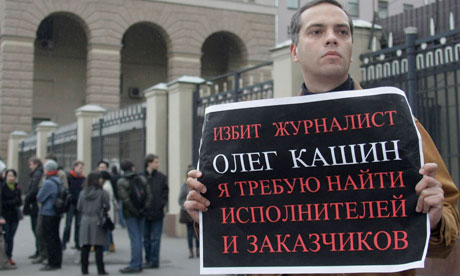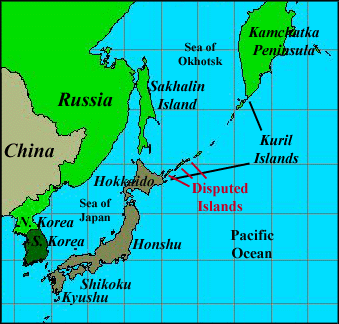Since the results of the U.S.'s November 2nd elections came in, Russians have been worrying. With a larger number of Republicans in the Senate, it seems likely that the New Start treaty will not be ratified.
The treaty, which was signed by both President Obama and President Medvedev some months ago, fills a gap left by the old START treaty (Strategic Arms Reduction Treaty; see definitions at bottom of page) which expired after fifteen years. Under the agreement, both sides pledge to reduce nuclear weapons and to allow regular inspections and inquiries into nuclear facilities. Republican opposition claims that the new treaty is moving too hastily, putting America at risk by reducing nuclear arms, and wants to put off the ratification until the new Senate convenes. At that point, the treaty - once a central point in our country's foreign policy - will be lost in a slew of other measures and increased party bickering.
And that's a shame, because the New Start would be an affirmation of how both countries have striven to redefine and modernize their respective roles on the international stage. At least the recent meeting of NATO in Lisbon, which President Medvedev attended, showed more promising signs of cooperation (in shield and defense matters; see link below).
From the Moscow Times:
http://www.themoscowtimes.com/news/article/lavrov-wants-start-passed-in-2010/422787.html
From the New York Times:
http://www.nytimes.com/2010/11/19/world/europe/19start.html?_r=1&ref=russia
From the BBC, on NATO's meeting:
http://www.bbc.co.uk/news/world-europe-11799097
Search This Blog
Attack on Reporter Reveals Controversy and Contradictions, 11/9

An attack last week on Russian reporter Oleg Kashin, leaving him in a coma with several broken bones, has led to much debate in Russia. The beating is one of three recent assaults on journalists, and may have connection to a much-disputed development project in the Khimki Forest.
Oleg Kashin – well-known in Russia, for use of provocative language on online sites as well as for his reporting prowess – most recently was involved in protesting the proposed highway through the Khimki Forest, a plan which would involve razing entire sections of this natural habitat. Some authorities believe that this was what led to the attack, citing a similar attack on a popular environmental activist also against the project two days previous as proof. Another theory is that the attack was meant simply to intimidate independent journalism, using Kashin as a symbol in a tirade against freedom of the press. Freedom of expression has been a matter of some contention in Russia lately: just last week Medvedev vetoed a law that would restrict organized protests and rallies severely. A government paper, Itar-Tass, quoted him saying that “without the emancipation of the people, the human potential, nothing can be done.” On the other hand, many other repressive measures are still in place and Russia is still considered one of the most dangerous places in the world to be a reporter.
As of yet, the police still do not know who organized the attack or why – despite the aid of several international journalism organizations, the protests of the U.S. embassy, and Medvedev’s personal proclamation that whoever was in charge will be punished, no matter who they may be. In the meantime, students show their support in constant one-man picketing (all the demonstration they can legally do), and the Russian journalists’ union has advocated a protest column in all Moscow papers on the 5th of each month until the case is solved.
Oleg Kashin – well-known in Russia, for use of provocative language on online sites as well as for his reporting prowess – most recently was involved in protesting the proposed highway through the Khimki Forest, a plan which would involve razing entire sections of this natural habitat. Some authorities believe that this was what led to the attack, citing a similar attack on a popular environmental activist also against the project two days previous as proof. Another theory is that the attack was meant simply to intimidate independent journalism, using Kashin as a symbol in a tirade against freedom of the press. Freedom of expression has been a matter of some contention in Russia lately: just last week Medvedev vetoed a law that would restrict organized protests and rallies severely. A government paper, Itar-Tass, quoted him saying that “without the emancipation of the people, the human potential, nothing can be done.” On the other hand, many other repressive measures are still in place and Russia is still considered one of the most dangerous places in the world to be a reporter.
As of yet, the police still do not know who organized the attack or why – despite the aid of several international journalism organizations, the protests of the U.S. embassy, and Medvedev’s personal proclamation that whoever was in charge will be punished, no matter who they may be. In the meantime, students show their support in constant one-man picketing (all the demonstration they can legally do), and the Russian journalists’ union has advocated a protest column in all Moscow papers on the 5th of each month until the case is solved.
From the Moscow Times:
From ITAR-TASS:
From the New York Times, on the veto:
Russia Favors Development Over Diplomacy in Island Dispute, 11/3

Yesterday, Japan withdrew its ambassador to Russia in protest over a reignited territorial dispute concerning the sparsely inhabited, oil-rich Kuril Islands. The issue was brought to life with Russian President Medvedev’s visit to the islands last week, during which he promised the local people modernization and praised the southern-most island as one of Russia’s “beautiful places.”
The Kuril Islands (called the Northern Territories by Japan) are a chain of four islands stretching from just North of Japan to the Southern tip of the Kamchatka Peninsula, part of Russia. Originally the islands belonged to Japan, but they were seized by Soviet forces at the end of World War II – forces who then deported the Japanese citizens on the islands, and brought in Russian settlers. Since that time, no conclusion has been reached about the true ownership of the islands. Several times in the past Russia offered to make a treaty with Japan, splitting the islands evenly between the two countries, but Japan remained intent on regaining the entire archipelago.
President Medvedev is the first Russian leader to visit the islands. For a tourist, they present little attraction; however, the surrounding waters have been found to be rich in fish and potential oil fields (not to mention handy travel routes for trade vessels). Russia has promised to invest in the development of the islands, just as Medvedev has promised to return to them soon. It is characteristic of Medvedev to act somewhat aggressively in the face of territorial disputes. His move, therefore, is seen more as a domestic measure – showing commitment to holding on to territories and bringing all of Russia’s various regions into the future – than as an international clash.
The Kuril Islands (called the Northern Territories by Japan) are a chain of four islands stretching from just North of Japan to the Southern tip of the Kamchatka Peninsula, part of Russia. Originally the islands belonged to Japan, but they were seized by Soviet forces at the end of World War II – forces who then deported the Japanese citizens on the islands, and brought in Russian settlers. Since that time, no conclusion has been reached about the true ownership of the islands. Several times in the past Russia offered to make a treaty with Japan, splitting the islands evenly between the two countries, but Japan remained intent on regaining the entire archipelago.
President Medvedev is the first Russian leader to visit the islands. For a tourist, they present little attraction; however, the surrounding waters have been found to be rich in fish and potential oil fields (not to mention handy travel routes for trade vessels). Russia has promised to invest in the development of the islands, just as Medvedev has promised to return to them soon. It is characteristic of Medvedev to act somewhat aggressively in the face of territorial disputes. His move, therefore, is seen more as a domestic measure – showing commitment to holding on to territories and bringing all of Russia’s various regions into the future – than as an international clash.
From the New York Times:
From the Moscow Times:
Analysis of the conflict, by the BBC:
Subscribe to:
Posts (Atom)